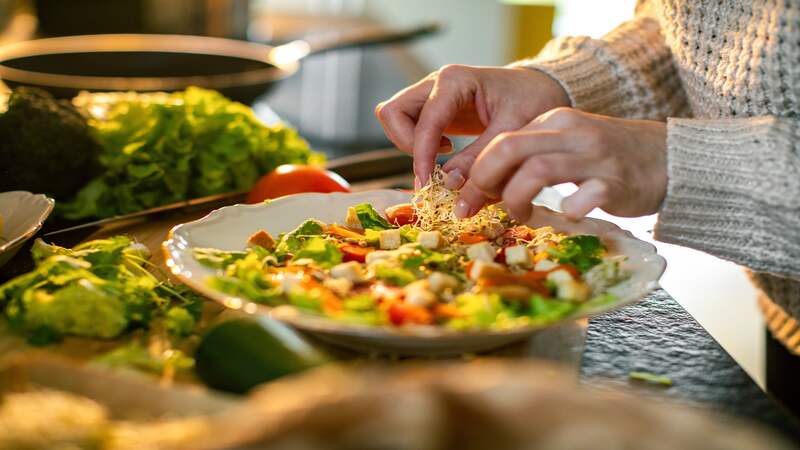
The fertility struggle is real. While there are many couples getting pregnant by accident and stuck not knowing what to do, there are others trying very hard to conceive. From trying different fertility foods, and sex positions, calculating dates, to consulting different doctors and treatment options, the list is endless. For couples looking for the must-include foods to conceive, this article lists the top fertility foods for women (1).
Infertility can be quite tricky and at times, the problem can be very simple, requiring just a little extra care. Stress and food can be real factors playing havoc with your fertility (2). We have more than 15 food options along with their uses and nutrient values, to help you in your pregnancy journey.
Video of Food Boosters for Female Fertility
What is a Fertility Diet?
A fertility diet is a diet plan that helps you include fertility-boosting foods. These foods are rich in fertility-boosting nutrients essential for a successful conception. Though these foods can increase the nutrient content in your body, they may not guarantee to help you get pregnant. These foods can only help “boost” your fertility, and not solve any fertility-related issues.
Fertility Boosting Nutrients
We all know fruits and vegetables are loaded with essential nutrients that are very beneficial to the human body, at all times and ages. Increasing the fruit, and vegetable intake; and consuming plant-based fats instead of trans fats and whole grains can make a big difference to your health. Some fruits and vegetables have more nutritional value than others. Adding such highly nutritious foods to your daily or regular diet can help improve your fertility and overall health (3).
Do Fertility Foods Really Exist?
While no single diet will cure fertility problems, eating some meals regularly may benefit the reproductive system more than others. These foods contain antioxidants and nutrients that promote ovulation or improve the quality and quantity of sperm over time.
Role of Fertility Foods in Female Fertility?
Maintain a healthy weight and eat fertility foods rich in folic acid, iron, dietary fiber, omega-3 fatty acids, plant-based protein, and other vitamins and minerals to prepare for pregnancy and improve fertility (4).
Top 16 Fertility Foods For Women
Now that we know what fertility foods are and how they can benefit you, let us delve into the list of top fertility foods for women that help improve fertility and overall health, which will contribute to a safe and healthy pregnancy and delivery (5,6).
Low-GI plant-based Mediterranean diets high in dietary fiber, omega-3 fatty acids, MUFA fatty acids, plant-based protein, antioxidants, flavonoids, vitamins, and minerals improve female fertility, assisted reproductive technology (ART) success, and male sperm quality (7, 8).
The Mediterranean diet can be identified by high consumption of vegetables (roots, tubers, green leaves, beans, and legumes), citrus fruits, olive oil, unprocessed carbs (whole grains), low-fat dairy and poultry, oily fish, and red wine, with low consumption of red meat and refined carbs (9).
1. Green Leafy Vegetables
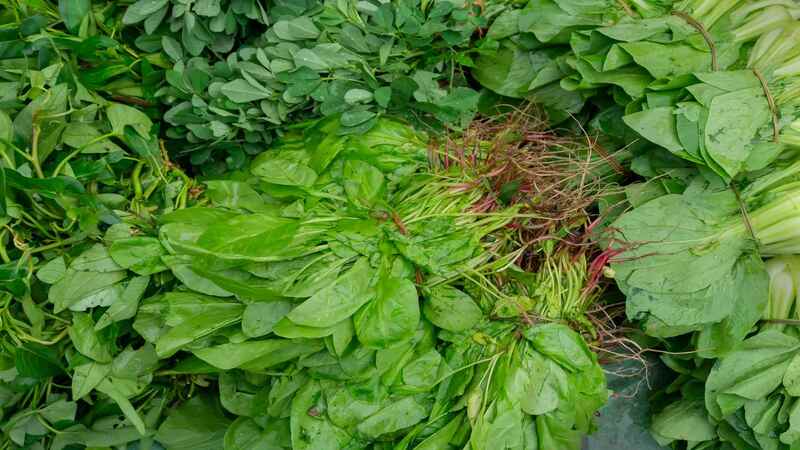
Greens are among the top fertility foods for women. They are rich in many nutrients, such as Vitamins A, C, K, and many Bs, including folate, which is vital for fertility. They are also an excellent source of essential minerals such as magnesium, manganese, iron, calcium, protein, and a lot of fiber. They contain good carbohydrates and help reduce weight.
2. Cabbage

Consuming half a cup of cabbage can provide you with 1/3rd of your daily requirement of vitamin C. It is also rich in fiber, potassium, magnesium, Vitamin A, K, and folate.
3. Potatoes

These may get a bad rap as they are rich in glycemic index and have too many carbs. However, potatoes are rich in Vitamin C, B6, protein, and potassium. Everyone needs carbs to fuel their bodies, so avoiding carbs is not a healthy choice. Having potatoes in moderation (cooked healthily, of course) can help women boost their fertility levels.
4. Broccoli

When considering the list of top fertility foods for women, broccoli can’t be missed. This vegetable is an excellent source of Vitamin C, K, potassium, fiber, and iron. Iron is very important for pregnancy as it is responsible for making new red blood cells.
5. Banana

Bananas are an excellent source of potassium. They are also rich in fiber, good sugars, and carbs. Bananas have no fat and are low in calories.
6. Citrus Foods
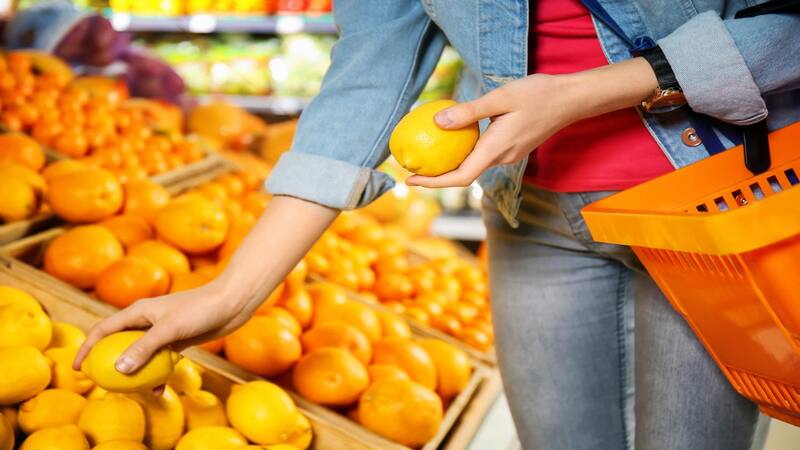
Citrus fruits are excellent in Vitamin C, an essential nutrient for a healthy pregnancy. They are also rich in antioxidants, carotenoids, phytonutrients, flavonoids, and polyphenols (10). These nutrients help in improving your immune system which is important for conceiving.
7. Salmon
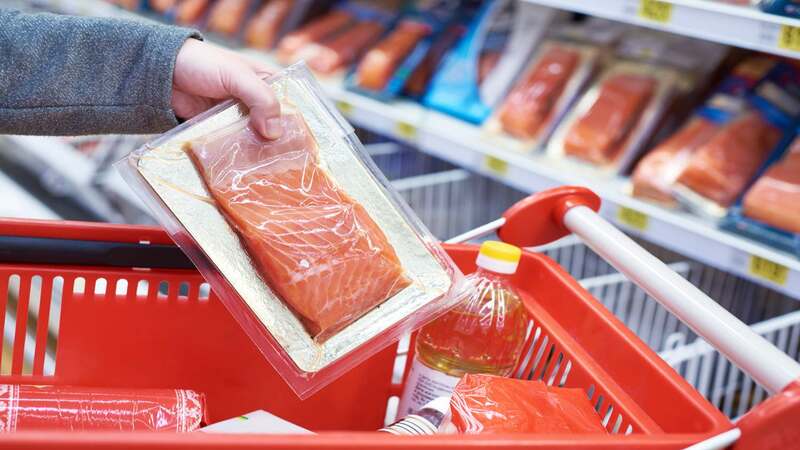
This seafood is rich in protein and has no carbs. This is why salmon is preferred by those who want to lose weight. It is also rich in omega-3 fatty acids, vitamin D, and A (11).
8. Avocado

This fruit has multiple nutritional benefits. It is a rich source of vitamins C, K, E, and B6. Avocado also contains high levels of folate, riboflavin, magnesium, potassium, and omega-3 fatty acids. It is a good source of fiber with almost zero sugar.
9. Garlic

This tiny white thing with a pungent smell and taste is a rich source of calcium, potassium, and phosphorous. Garlic can add a distinct flavor to the dish and can improve your heart health to a great extent. It helps reduce inflammation and boost immunity. You can eat it raw or add it to most of your cooked dishes.
10. Berries

These are healthy and tasty, one of those rare combinations. They are rich in antioxidants, fiber, Vitamin C, and manganese. One cup of strawberries can provide your daily Vitamin C requirement.
11. Shellfish
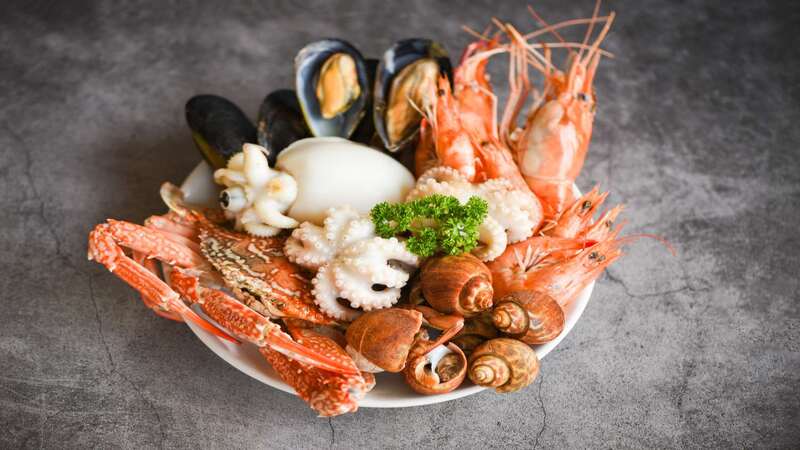
These are low in calories and rich in protein; another favorite for those who want to lose weight. They are also rich in iron, zinc, calcium, and omega-3 fatty acids.
12. Oysters
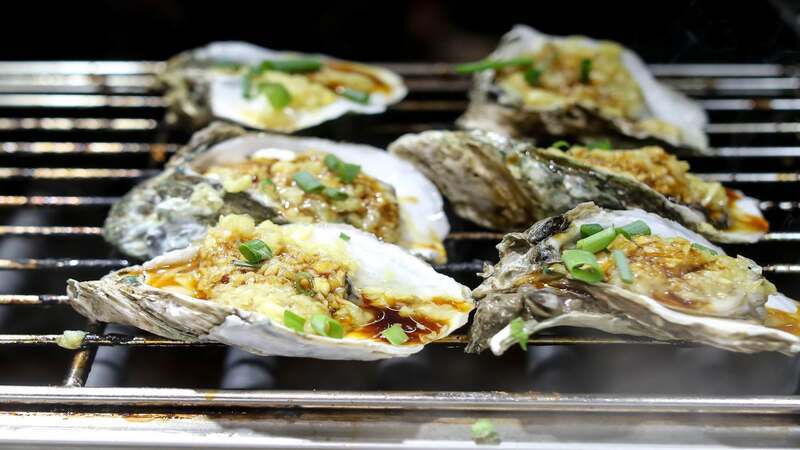
These are rich in vitamin D, B12, zinc, copper, and selenium, and contain a good amount of various other nutrients (12). These are very healthy but pose a certain amount of risk as well. Always buy oysters only from a reliable source and consume only if you don’t show any allergic reactions. Raw oysters may sound tempting but they carry a high risk of food poisoning. Always opt for well-cooked oysters.
13. Turmeric

This traditional Indian spice and kitchen staple is quite popular for its medicinal properties. Almost every household in India will have turmeric in their kitchen. It has anti-inflammatory properties that can help in many ailments. (13)Turmeric is also rich in nutrients like manganese, iron, carbs, and protein. Adding a pinch of turmeric to all your dishes can go a long way in protecting your body.
14. Almond

This nut is full of calories and nutrients. It is a very rich source of monounsaturated fats, protein, and fiber. Monounsaturated fats are vital for heart health as they help reduce bad cholesterol and provide good energy for the body. A handful of almonds soaked overnight can be a good addition to your breakfast. Almonds help improve your brain activity and the benefits can pass on to the fetus after conception.
15. Walnut

Also known as brain food, walnuts help improve your brain functioning and also help improve the quality of your sleep. Sleep is very important for the body to recover and rejuvenate after a full day of activity. Walnuts are an excellent source of antioxidants and omega-3 fatty acids as well. They contain the most amounts of antioxidants when compared to other nuts or food items.
16. Whole Grains

The significance of whole grains for fertility and overall health can never be underestimated. Whole grains are very rich in fiber, which is essential for better digestion and energy. These grains are packed with essential nutrients like proteins, Vitamin B, many trace minerals as well as antioxidants. (14) They are low in calories and regular consumption can help improve your heart’s health, prevent or control type 2 diabetes, and also fight certain forms of cancer. If you are planning to have a baby, it is always a good idea to curb refined foods and shift to whole foods.
Trying to conceive can be quite an exciting and tedious journey for some. Taking care of your diet can be your first step towards a successful conception. Adding the above foods to your regular diet can help improve your health and your fertility levels as well. When you follow a good diet and an active lifestyle, your body gets healthier, giving a conducive environment to conceive. Even when you are facing other health-related issues that are preventing you from conceiving, a healthy diet will provide you with the necessary stamina as you go through your treatments.
FAQ’s
1. Can I Get Pregnant if I Eat Fertility Foods Every Day?
While eating fertility foods can assist in pregnancy, they do not guarantee that you will get pregnant. These foods only increase the chances of conception by providing the necessary nutrients. If there are other fertility-related issues, only doctors and treatments can help.
2. Should I Avoid All Trans Fats and Complex Carbs to Get Pregnant?
It is not necessary to cut them all out completely. However, an excess of both can cause harm to your health. Avoiding them or reducing their intake considerably can help improve fertility. Moderation is the key.
3. Can I Eat All Fertility-Boosting Foods Even During Pregnancy?
You need to ask your doctor. Many women develop allergies and resistance to certain foods. Also, some foods are not advisable for pregnant women as they can lead to a miscarriage.
4. What Foods Increase Female Fertility?
Foods containing significant fertility nutrients, such as omega-3 fatty acids, folate, zinc, selenium, iron, and vitamin E, may increase female fertility. Adherence to a low-carb plant-based diet that provides folic acid, B12, and omega-3 fatty acids may benefit women trying to get pregnant.
5. Which Fruit is Best For Female Fertility?
Whole fruits, such as bananas, strawberries, raspberries, avocados, oranges, mangos, guava, and apples, are high in fiber, minerals, and vitamins, all beneficial to female fertility.
6. Which Foods Have Folic Acid?
Folate is found naturally in many foods, including legumes and beans, eggs, citrus fruits, and fortified grains.
Reference
- https://pubmed.ncbi.nlm.nih.gov/34139003/
- https://pubmed.ncbi.nlm.nih.gov/29733398/
- https://pubmed.ncbi.nlm.nih.gov/32324714/
- https://www.sciencedirect.com/science/article/pii/S2161831322005129
- https://pubmed.ncbi.nlm.nih.gov/36904180/
- https://pubmed.ncbi.nlm.nih.gov/36235567/
- https://www.ncbi.nlm.nih.gov/pmc/articles/PMC8634384/
- https://www.ncbi.nlm.nih.gov/pmc/articles/PMC7326597/
- https://pubmed.ncbi.nlm.nih.gov/29614726/
- https://www.ncbi.nlm.nih.gov/pmc/articles/PMC8094745/
- https://www.ncbi.nlm.nih.gov/pmc/articles/PMC9308390/
- https://www.ncbi.nlm.nih.gov/pmc/articles/PMC6210343/
- https://pmc.ncbi.nlm.nih.gov/articles/PMC8572027/
- https://www.heartandstroke.ca/articles/10-whole-grain-secrets

